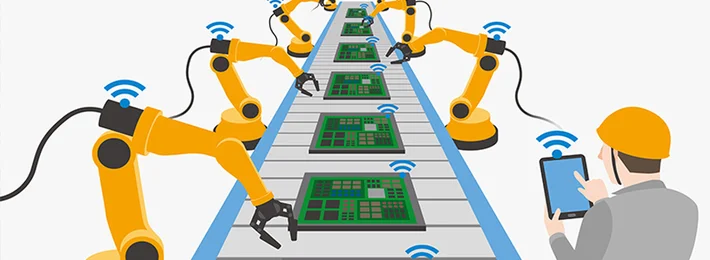Industrie 4.0 and Product Piracy
2016-12-14 Terry Gaul

Industrie 4.0, a.k.a. the fourth industrial revolution, is representative of the global strategic initiative to revolutionize industry by integrating digital automation, interoperability and advanced data exchange into manufacturing technologies. And while it enables the enormous potential of smart factories, Industrie 4.0 also brings with it new threats and challenges in the form of product piracy.
For example, a 2014 study reported by the National Association of Manufacturers (NAM) found that “unfair competition from abroad fueled by stolen software is a significant drain on manufacturing in the U.S. with estimated losses between 2002 and 2012 totaling nearly $240 billion in manufacturing revenue, $70 billion in GDP and 42,220 U.S manufacturing jobs.”
The NAM report also revealed that:
- One-third of NAM members report theft of IP, trade secrets or proprietary knowledge being stolen by competitors in emerging markets.
- Three out of five NAM members say that IP and trade secret theft impacts their overall global competitiveness, including a third who say it has a strong impact.
- Manufacturers are reluctant to do business with firms in emerging markets out of concern for theft or use of IP, trade secrets and proprietary information in direct competition with their interests.
But, product piracy is not just unique to U.S. manufacturers. VDMA, Europe’s largest mechanical engineering federation representing over 3,100 companies in the capital goods industry, has been monitoring and expressing growing concern about the industrial product piracy epidemic for many years.
Dr. Reinhold Festge, VDMA President, said: “Industrie 4.0 is promising fundamental changes for us; the evolution of the knowledge economy is not stopping at the factory gates. Digitalization and connectivity have enormous potential and promise, but also bring new threats and challenges in the form of product piracy. The risks are all too obvious and wide-spread in the case of additive manufacturing, that is, 3D printing. As soon as the forgers and fakers get their hands on the digital blueprint, they are in a position to produce perfect illicit copies: indeed, it is hard to speak of counterfeits, when we are dealing, for all intents and purposes, with identical products. There are now early reports of ‘Counterfeiting as a Service’, with 3D printing centers specializing in product piracy on demand.”
To closely monitor the extent of the piracy problem in Germany, the VDMA conducts a study of its members every two years and results from the 2016 survey put the spotlight on the reality of the problem. Here are a few of the key findings.
- 70 percent of the participating companies are victims of product or brand piracy.
- Annual damage to Germany’s mechanical engineering sector is estimated at a full €7.3 billion, equating to approximately 34,000 jobs.
- 83 percent of all companies name China as a country of origin of counterfeits.
- The measures taken locally – in the typical countries of origin of fake products – are not seen as sufficient to help meaningfully in the fight against product piracy.
- 48 percent of companies see a risk to the safe operations of their systems caused by counterfeit parts; 39 percent draw attention to immediate danger to life and limb (with consumers at risk in the food industry or users at risk in the case of industrial appliances).
- The most severely affected parts of the mechanical engineering sector are:
- Engines and systems (92 percent)
- Plastic and rubber machines (92 percent),
- Textile machines (91 percent).
- Reverse engineering is the most common source of counterfeits, followed by lost know-how, e.g. by former members of staff (32 percent); 13 percent of the surveyed companies have experienced outright industrial espionage.
If you would like to learn more about the survey findings and the VDMA’s efforts to address the threats posed by product piracy, you can download the full report here.
Contributor

Terry Gaul
Vice President Sales USA
Terry Gaul is a sales and business development professional with extensive experience in the software and technology sectors. He has been involved with software protection and licensing technologies for more than 20 years and currently serves as Vice President of Sales at Wibu-Systems USA. When he is not helping customers with software licensing, Terry typically can be found coaching his daughters' soccer teams or camping with his family on the Maine coast.









